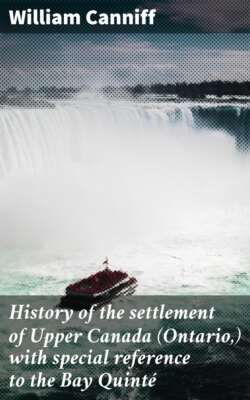Читать книгу History of the settlement of Upper Canada (Ontario,) with special reference to the Bay Quinté - William Canniff - Страница 23
На сайте Литреса книга снята с продажи.
PENNSYLVANIA.
ОглавлениеThis splendid colony was granted to William Penn, the Quaker and philanthropist, who was the son of Sir William Penn, an eminent English admiral. Sir William held a claim against the British government for £16,000; and, some time after his death, his son having his attention directed to the new world, obtained, in lieu of that amount, the grant of land now forming this State. The charter was granted by Charles II. in 1681. Penn sought the new world to escape the persecutions inflicted upon him at home. This he had brought upon himself, by freely expressing his decided sectarian views, and by writings, disseminating the teachings of George Fox, also by attacking the Established Church. He was repeatedly imprisoned in the Tower, and even in Newgate for six months. Penn, on procuring the grant of land, determined to make it “a home for his co-religionists, where they might preach and practice their convictions in unmolested peace.” To the territory he gave the name of Sylvania; but afterwards King Charles insisted that Penn should be prefixed, making it Pennsylvania. Penn sailed from England, with several friends, in August, 1682. On reaching America he found that some Swedes and Finns had settled along the banks of the Delaware. Although Penn had a charter by which he could possess the land, yet, as an European, he did not forget the original and rightful owners of the soil. Penn’s conduct in this respect stands out in striking contrast to the course pursued by the Puritans. It was on the 30th November, 1682, that William Penn held his famous interview with the Indian tribes, when he effected a straightforward treaty with them, never to be broken or disturbed, so that he secured perpetual peace and respect. By this humane course with the Indians, and by encouraging emigration of all classes, securing to them the fullest liberty of conscience by a wise constitution, he succeeded, with his co-religionists, in building up a most flourishing colony. Subsequently the population was enlarged by numerous accessions from Scotland and Germany.
The government of Pennsylvania was proprietary, and continued such until the revolution swept away the charter, and made the children of William Penn outcasts from the land they and their fathers had made fertile. At the time of the revolution, John Penn, son of Richard Penn, who was the grandson of William Penn, was the Governor of the colony. He, with the masses of the people in the middle States, was opposed to the rebellion. It is said there were thousands of loyalists in this State who desired and offered to serve the crown, but whose services were lost through bungling by those in office. Yet the State gave troops to the rebel cause; 400 in 1775, and in the following year 5,519. The quota allotted was 40,416; granted, 19,689.
